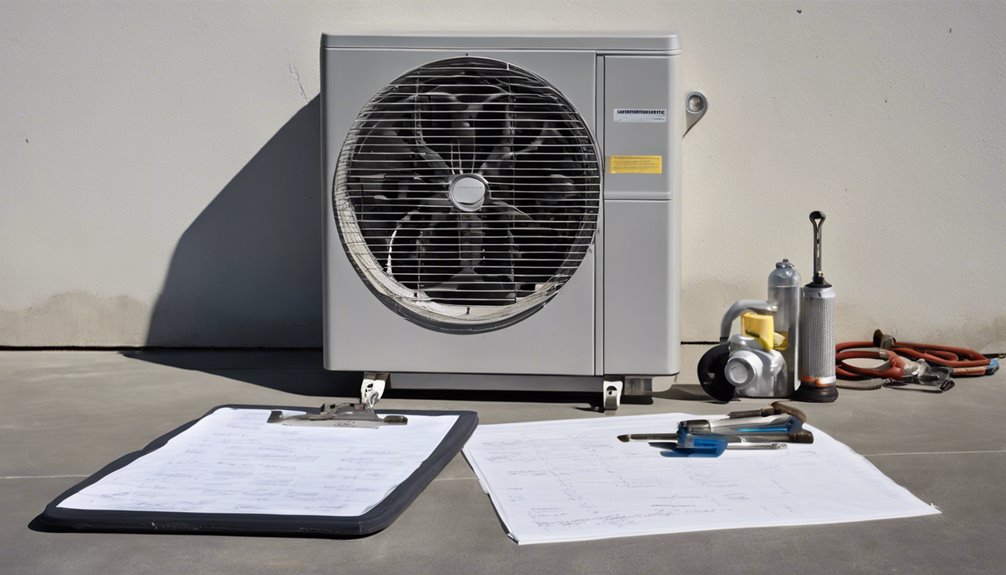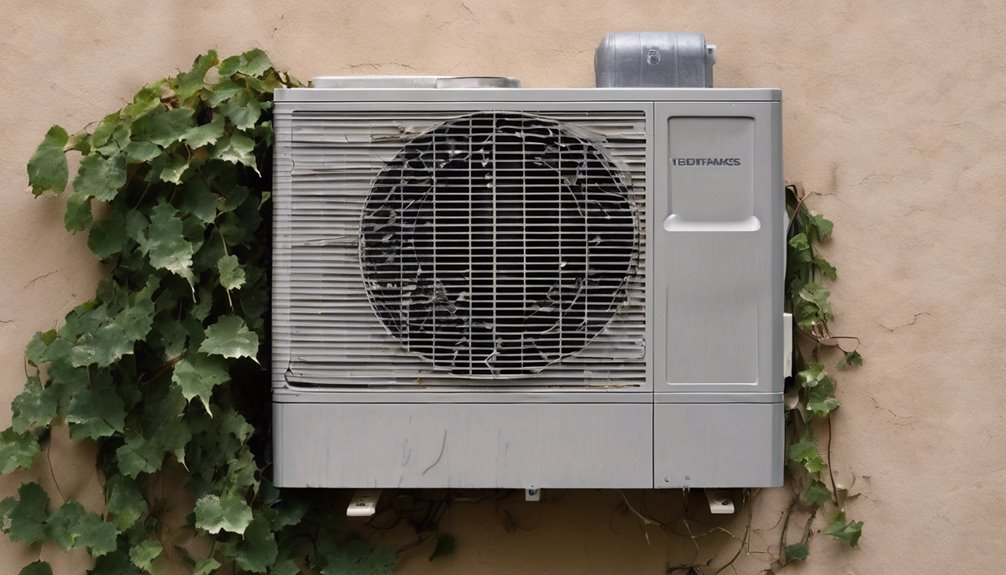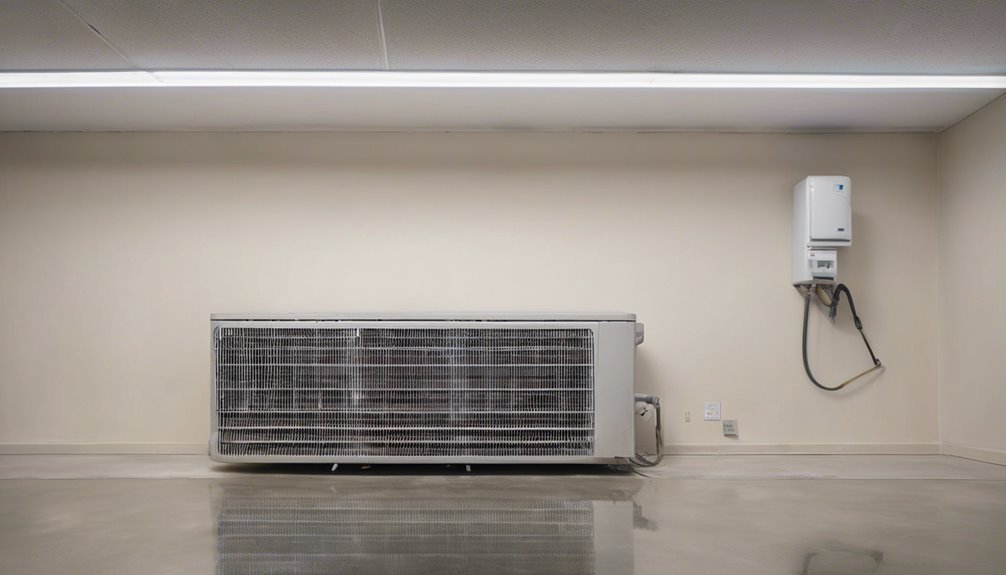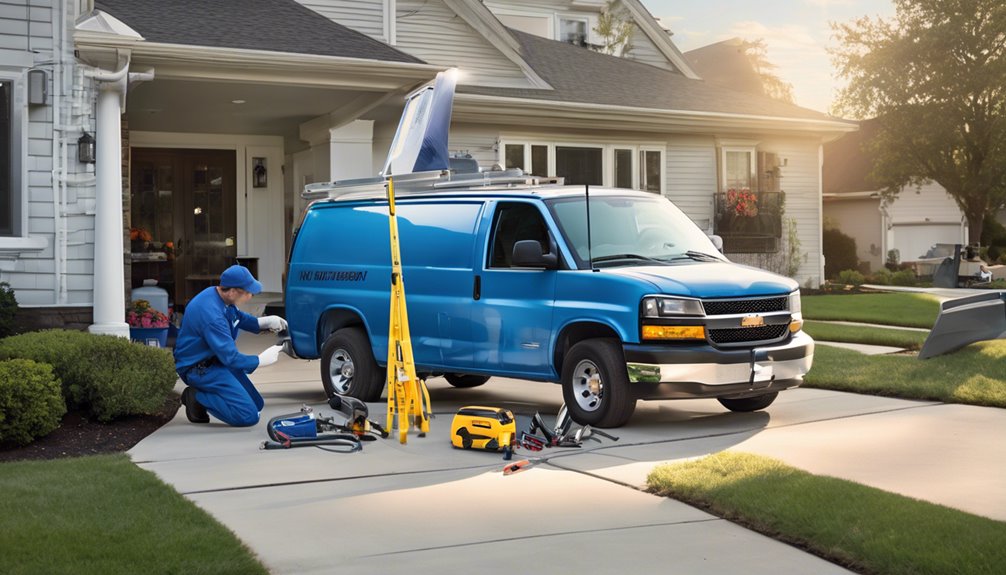By following a 7-point AC maintenance schedule, you'll ensure your air conditioner operates at peak efficiency, reducing energy bills and extending its lifespan. Start by cleaning or replacing air filters, then inspect and clean condenser coils to maintain efficiency. Next, check refrigerant leaks and levels, and lubricate moving parts and belts to prevent wear and tear. Don't forget to inspect and clean evaporator coils, check thermostat function and calibration, and verify proper drainage and water flow. By staying on top of these tasks, you'll enjoy a cooler, more cost-effective summer, and we'll explore each of these points in more detail if you keep going.
Key Takeaways
- Clean or replace air filters monthly and inspect condenser coils regularly to maintain optimal performance and reduce energy bills.
- Check refrigerant leaks and levels regularly to prevent system failure and ensure optimal performance.
- Lubricate moving parts, inspect belts, and check pulley alignment to prevent wear and tear on the unit.
- Inspect and clean evaporator coils regularly to ensure optimal performance and prevent reduced coil efficiency.
- Check thermostat function, calibration, and drainage installation to ensure the AC unit runs efficiently and prevents water damage.
Clean or Replace Air Filters
Clean or replace air filters every month, especially during peak usage seasons. You'll be surprised how much of a difference it makes in your AC's performance.
A dirty filter reduces airflow, making your system work harder and increasing energy bills. Moreover, it can lead to premature wear and tear on your unit.
Invest in high-quality filters that are designed for your specific AC model. Look for filters with a high MERV rating, which measures filter efficiency. Replacing filters regularly ensures optimal filter quality, allowing your AC to run smoothly and efficiently.
Inspect and Clean Condenser Coils
Your condenser coils, typically located outside, play a crucial role in dissipating heat from your AC's hot refrigerant gas.
Dirty coils hinder condenser efficiency, causing your AC to work harder and consume more energy. You'll want to inspect your condenser coils regularly to ensure they're clean and free of debris.
Start by turning off the power to your AC unit. Gently remove any large debris, like leaves or twigs, from the coils. Then, use a garden hose to spray the coils, working from the top down.
For tougher dirt buildup, you can use a mild detergent and a soft-bristled brush. Regular coil cleaning will help maintain your AC's performance and reduce energy bills.
Check Refrigerant Leaks and Levels
Refrigerant leaks and low levels can severely impact your AC's performance, leading to increased energy bills and potential system failure.
You should regularly check for refrigerant leaks and top off the levels to ensure optimal performance. Use refrigerant detection tools to identify any leaks and address them promptly.
A proactive approach to leak prevention will save you from costly repairs and replacements. During the inspection, check the refrigerant lines, fittings, and connections for signs of wear or damage.
If you're not comfortable with the process, consider hiring a professional to do the job. Remember, prevention is key to maintaining your AC's performance and extending its lifespan.
Lubricate Moving Parts and Check Belts
As you've ensured your AC's refrigerant levels are optimal, it's time to focus on the mechanical aspects of the system.
Now, you'll need to lubricate moving parts and check belts to prevent wear and tear. Start by inspecting the belts for signs of wear, such as cracks, frays, or excessive wear on the ribs.
Check the pulley alignment to ensure it's properly aligned, as misalignment can cause premature wear on the belts.
Lubricate the moving parts, including the blower motor and compressor, according to the manufacturer's instructions.
Proper lubrication will reduce friction and prevent overheating. Remember to check the belt tension and adjust it as needed to prevent damage to the system.
Inspect and Clean Evaporator Coils
The evaporator coils, typically located in the indoor unit, play a crucial role in absorbing heat from the air.
You'll want to inspect and clean them regularly to ensure optimal performance. Dirty coils can significantly reduce coil efficiency, increasing your energy bills and reducing the lifespan of your AC unit.
Start by turning off the power to the AC unit, then remove any protective grille or panel to access the coils.
Use a soft-bristled brush or vacuum cleaner to gently remove dirt and debris. Make sure to clean the coils from the underside, where dirt tends to accumulate.
Good coil accessibility is key to a thorough cleaning. By doing so, you'll restore your AC's ability to cool your home efficiently.
Check Thermostat Function and Calibration
You'll next want to verify your thermostat is functioning correctly and calibrated accurately to ensure your AC unit is running efficiently. A malfunctioning thermostat can lead to temperature fluctuation, which can increase your energy bills and reduce the lifespan of your AC unit. To check the thermostat function, turn it to a lower temperature and see if the AC unit kicks in. If it doesn't, you may need to replace the thermostat.
| Thermostat Condition | Symptoms | Solution |
|---|---|---|
| Inaccurate calibration | Temperature fluctuation | Recalibrate or replace thermostat |
| Faulty temperature sensor | Incorrect temperature readings | Clean or replace temperature sensor |
| Dead batteries | Thermostat not functioning | Replace batteries |
| Wiring issues | Thermostat not communicating with AC unit | Check and repair wiring |
Verify Proper Drainage and Water Flow
You'll want to ensure your AC's condensate drain lines aren't clogged, as this can lead to water damage in areas around your unit.
Check for proper drainage installation, and inspect the system for any signs of water accumulation or leaks. By doing so, you'll minimize the risk of water damage and prevent costly repairs down the line.
Clogged Condensate Drain Lines
How often do clogged condensate drain lines disrupt your air conditioner's performance? You might be surprised at how frequently it happens. Clogged condensate drain lines can lead to reduced airflow, increased energy bills, and even system failure. That's why regular drain maintenance is crucial.
| Method | Description | Frequency |
|---|---|---|
| Visual Inspection | Check for signs of clogging, such as water around the drain | Monthly |
| Vinegar Flush | Pour 1 cup of vinegar down the drain to dissolve mineral buildup | Quarterly |
| Professional Cleaning | Hire a professional to clean the drain line with specialized equipment | Annually |
Water Damage Risk Areas
When your condensate drain line is clogged, it's only a matter of time before water starts accumulating around your AC unit.
You'll want to identify water damage risk areas to prevent costly repairs. Check for signs of water accumulation around the unit, such as rust, corrosion, or mineral deposits.
Inspect the condensate drain pan for blockages or kinks that could hinder water flow. Consider installing humidity sensors or moisture detection systems to alert you to potential water damage.
Regularly inspect the area around your AC unit, especially during heavy rainfall or high humidity periods. By being proactive, you can prevent water damage and ensure your AC unit operates efficiently and effectively.
Proper Drainage Installation
Proper drainage installation is critical to preventing water damage and ensuring your AC unit operates efficiently.
When you install your AC unit, make sure the drainage system is sloped correctly to allow water to flow freely. A drainage slope of at least 1/4 inch per foot is recommended to prevent water from accumulating around the unit.
You should also ensure that the pipes are properly insulated to prevent condensation from forming. Pipe insulation will help reduce the risk of water damage and keep your AC unit running smoothly.
Frequently Asked Questions
Can I Perform AC Maintenance Tasks Myself or Hire a Professional?
You can try DIY AC maintenance, but be aware of limitations like lack of expertise and potential safety risks. Hiring a professional brings benefits like thorough inspections, efficient repairs, and extended system lifespan.
How Often Should I Inspect and Clean My Ac's Exterior Cabinet?
You should inspect and clean your AC's exterior cabinet every 2-3 months to prevent cabinet rust and ensure proper airflow, making sure to remove exterior obstructions like leaves or debris that can hinder its performance.
What Are the Signs of a Malfunctioning AC Capacitor?
You'll notice signs of a malfunctioning AC capacitor during capacitor inspection, such as bulging, rust, or burn marks. When AC troubleshooting, look for symptoms like reduced airflow, humming, or complete system failure, indicating it's time to replace the capacitor.
Can a Dirty AC Filter Cause My Electricity Bill to Increase?
You're wondering if a dirty AC filter is driving up your electricity bill. Yes, it can! A dirty filter reduces filter efficiency, increasing energy consumption, which leads to higher bills, so clean or replace it regularly to save some cash!
Will Regular Maintenance Void My Ac's Manufacturer Warranty?
You won't void your AC's manufacturer warranty with regular maintenance, as long as you follow the recommended guidelines. Check your warranty clauses, as some may even offer extended coverage if you keep a maintenance record.
Conclusion
You've made it through the 7-point AC maintenance schedule! By following these simple steps, you'll ensure your air conditioner runs efficiently, saves energy, and lasts longer. Regular maintenance also helps prevent costly repairs and reduces the risk of breakdowns. Now, take a deep breath and enjoy the cool air flowing through your home, knowing you've done your part to keep your AC in top shape.



